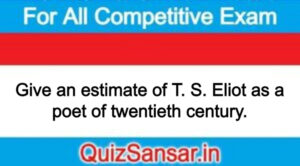
Give an estimate of T. S. Eliot as a poet of twentieth century.
Give an estimate of T. S. Eliot as a poet of twentieth century.
Or
Narrate Eliot’s obscurity and classicism.
Ans.
Introduction
As a dramatist and poet of twentieth century in English literature, T.S. Eliot needs no defense. Remark of David Daiches is not acceptable that he was a minor poet. He passed his career of poet over forty five years to the service of English poetry. He tried his hand on literary and social criticism and journalism too. He achieved great success in all fields of his creation. No other English poet obtained s wide greatness as he achieved in the twentieth century. His poetry is a city in itself which describes the loss of old tradition, moral and sexual vacuity, sordidness, meanness and degeneracy of modern era. He barely exposed the evil fact of his contemporary period so that the worst may be righted. His sole purpose is to awake the modern society from the dreams of romantic attitude of character and life.
His Sense of Tradition
Eliot fines for old traditions, authority and moral values. He describes the hollowness of modern European tradition in the comparison of old tradition. Like the authors of 18th century he uses his tradition for the incidental symbolism but his acceptance like thes authors is not slavish. He allows a right to the modem society to explain old traditions in the reference of modem use. He needs individual talent and experience. Free and uncontrolled expression of individual talent results in chaos and eccentricity, it is a tradition which should control and guide individual talent. European literature as a single whole provides to Eliot a pattern for his early poetry. His later poetry provides Christianity and its principles to society.
Eliot’s Classicism
In his early poetry Eliot seems negative in his, expression. He finds everything degenerating-a complete waste land of faith, moral and values. In his later poetry Eliot seems to express his positive and constructive views of Christian faith. He seeks to formulate a philosophy of religion which should present enough strangeness of moral and character. In 1928 he declared that he was “a classicist in literature, a royalist in politics, and an Anglo. Catholic in religion.” He bears positive as well as negative aspect of his classicism. He is a classicist in the sense that he discards all romantic, notions prevalent in the twentieth century. To him, romantic poetry is an escape from the reality of life while Eliot believed that a poet should face all troubles of life and character. Romantic literature describes a free and uncontrolled expression of personal emotions while Eliot believed in letting loose of emotion and escape from emotion. To him poetry should not be an expression of personality but an escape from personality.
Eliot’s Obscurity
No doubt that Eliot was a scholar. His poetry is not simple and expression of personal feelings. He is not a writes of common men. His poetry is heavily over-loaded with allusions and quotations from different religions, literatures and legends. His philosophy belongs to East as well as West. In his poem The Waste Land alone there are allusions and quotations from thirty-five authors, relating to six languages. He bears Donne’s technique and the symbolism of Baudelaire, Valery, Laforgue and Mallarme. He has the depth of Donte. He writes interior monologue in psychologic and neurotic manner of the speaker. He introduces his character to narrate the depth of his soul and imagination. There are dreamy changes of the subjects and interests in a single poem. His poem seem a combination of different abnormal feelings of different views on the single subject. His poetry is a faithful expression of shapeless and disorganized ideas, and hence, too difficult to understand. His later poetry is not filled with too much quotations.
His Symbolism
Eliot did not believe in the over fellow of emotions. He dictated that emotions should be controlled with the help of intellect. He uses emotion intellect, serious sensuous and spiritual, the past and the present, the gay and the serious constantly in a single whole. This is what the great symbolists have done. Poetry no longer remains a serious art but became a matter of inspiration. Eliot criticized French symbolists too much but his symbolism has been taken from them. He uses quotations, images and farfetched smiles and highly evocative from mythologies. In this way he uses some hitting words from different authors and legends. These words serve for symbolic purpose. He connects past with the present in unique way. His quotations are not merely decorative rather they serve his specific purpose showing his intellect and sense of old traditions. Different objects of nature are his symbols.
His Verification
Eliot’s poetry deals with the contemporary civilization. He uses too much quotations and allusions of different authors, religions and legends. His words are his quotations with a new appeal of meaning. He opted his symbolize style from French symbolists. His ideal poet was Edgar Allan Poe who believed ‘art for art’s sake’ and Eliot believed in ‘a poem for poem’s sake. “It is a different matter that Eliot poured a bitter criticism against French symbolists and Poe who was father of French symbolism. His… verse form is flexible which suits to moods of kinds of poetry. The hollowness and moral vacuity of his poetry narrates the manners of contemporary life. He left the conventional meter behind. He did not follow the path of romantic poetry to express personal feelings abundantly. Yet, more or less every author is biographic. After all discussions Eliot innovated a new tradition and language to the present literature. Poetry could find a new way and future through his poetry.
-
Write the critical appreciation of the poem No. 12 entitled Far Below Flowed.
-
Write the critical appreciation of the poem No. 11 entitled Leave this Chanting.






